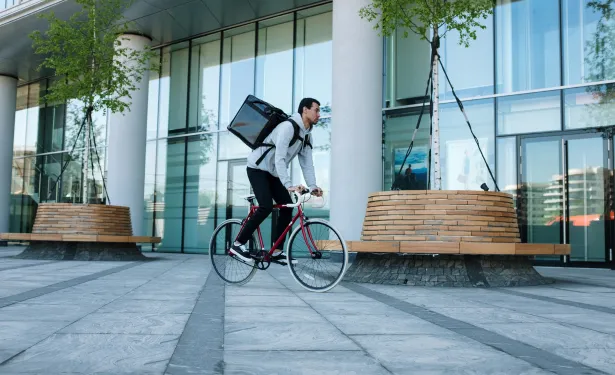Sustainable Hospitality: Navigating the Green Path in the Food and Beverage Industry
- Nov. 15, 2023
- FMCG HORECA BUSINESS

There is a tug-of-war between the food and beverage industry and food delivery services as companies look to boost earnings while also taking sustainability into account, which means modifications to operations. Grubtech's CEO and co-founder, tech disruptor and international entrepreneur Mohamed Al Fayed, addresses the difficulties the sector has in striking a careful balance between environmental awareness and financial success.
The online food delivery (OFD) market has grown steadily, and over the next five years, it is expected to increase at a CAGR of 12.6%. The OFD market is projected to grow to USD 1.65 trillion by 2027. Although the pandemic was undoubtedly a major factor in this expansion, widespread lockdowns also provided an unintentional window of opportunity for short-term improvements in air quality. We witnessed a cleaner atmosphere during that time, which piqued our interest in sustainability. Customers increasingly want delivery alternatives that are cleaner, and in order to fully meet their demands, three essential pillars must be taken into account:
cleaner modes of transportation
Businesses are switching to electric cars in an effort to provide cleaner delivery services. On the other hand, the increase in on-demand delivery has led to more cars—especially carbon-emitting ones—on the road in crowded cities. As a result, creative approaches to reducing these difficulties and doing away with carbon emissions are emerging. Restaurants are using electric vehicles for short local deliveries (less than a respectable radius), but they are also using bicycles, e-bikes, and walking for smaller orders. Electric cars are expected to become the norm for delivery, even over large distances and cities, as technology develops and they become more widely available.
Eco-friendly packaging
Eco-friendly packaging is required in restaurants. According to studies, over 56% of patrons like eateries that utilise eco-friendly packaging free of single-use plastic, and 54% favour restaurants that limit the amount of packaging used when delivering meals. When a user places an order, delivery apps have the option to remove the silverware, which helps them lessen their carbon footprint. Restaurants are making the switch to sustainable and biodegradable packaging, which includes eco-friendly cutlery. Restaurants may make a major contribution to the sustainability culture by adopting the mass manufacture and use of sustainable packaging.
Applying AI to food waste
Restaurants frequently fail to account for the whole environmental damage caused by food waste. Methane, a powerful greenhouse gas that is 25 times more dangerous than carbon dioxide, is produced when food rots. A startling 1.3 billion tonnes of food are wasted by humans every year, which is roughly one-third of the food produced globally. By using algorithms and past data to forecast common items that are frequently wasted, AI can significantly contribute to the reduction of food waste. AI can also maximise the use of ingredients to reduce waste and promote more effective inventory control.
Restaurant operators can reduce food waste and start noticing patterns that result in this behaviour by implementing minor adjustments and basic analytics.
Clearly, there are a number of obstacles in front of us. Globally fostering a culture of sustainability will be difficult, if not impossible, to implement. Since sustainability is costly, it will take careful planning and dedication to lead this project and make the globe a greener place for coming generations.
Among the solutions are biodegradable packaging, e-vehicles for transportation, and artificial intelligence to reduce food waste.
Online meal delivery has a big chance to contribute significantly to lowering the enormous carbon footprint of the food and beverage industry, especially with the rise of sustainable practises and Generation Alpha's support for environmental causes.











